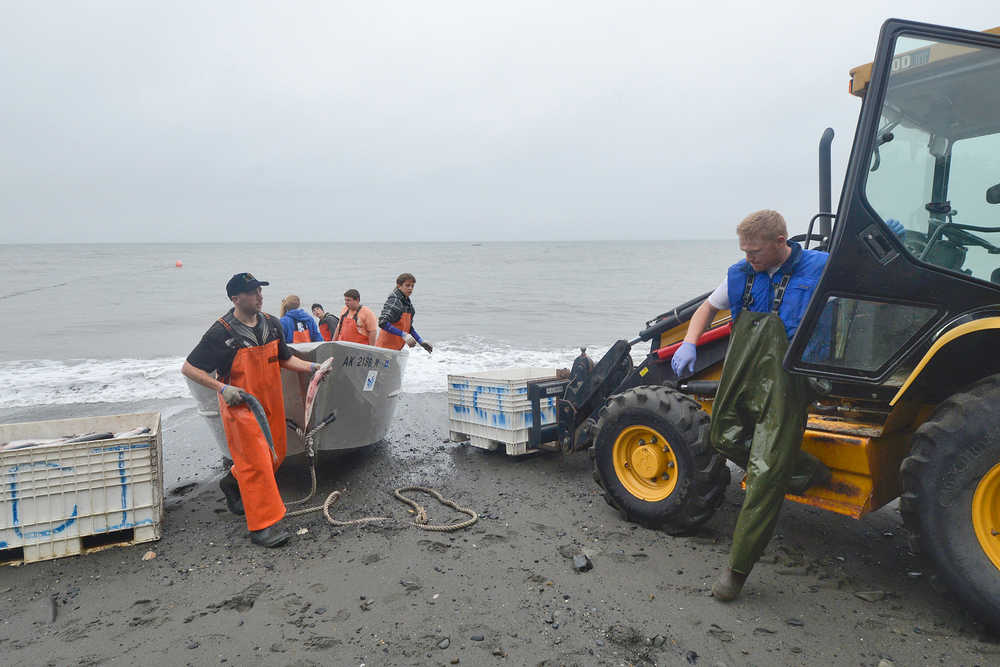ANCHORAGE — The Alaska Fisheries Conservation Alliance and the State of Alaska each made their case to an Anchorage Superior Court judge today about why — or why not — a proposed ballot initiative to ban setnetters should be allowed to move forward.
The alliance, or AFCA, filed a ballot initiative petition in November seeking to ask voters whether to ban setnets in urban parts of the state, which would primarily impact Upper Cook Inlet setnetters.
At the heart of the case is a question about whether a ballot measure eliminating setnetting is considered an appropriation under state law, and thus not a question that can be placed on a ballot for the public to decide.
Lt. Gov. Mead Treadwell struck down the initiative in January based on a state Department of Law opinion asserting that it would be a prohibited appropriation.
AFCA appealed, and during oral argument Tuesday, attorney Matt Singer said that organization believed the initiative is not an appropriation, and that the public’s right to weigh in on fish and wildlife management using the ballot initiative process should be interpreted broadly, with the appropriations limitation interpreted narrowly.
Upper Cook Inlet setnetters target sockeye salmon for commercial harvest. Their permits also allow to them to target other salmon species, including kings, that swim into the nets.
Eliminating setnetters in Cook Inlet would likely result in increased catch for in-river sport fishermen, personal use fishermen, and for the fleet of drift boats targeting sockeye.
AFCA members have said they believe that eliminating setnets is necessary to conserve the kings.
Alaska Assistant Attorney General Elizabeth Bakalar, who is representing Treadwell in the case, argued that because the ballot initiative would eliminate an entire fishery — Upper Cook Inlet setnetters — and send their catch to others, it was an appropriation.
Singer, however, said that while it eliminated a gear type, it did not necessarily allocate them to any other users.
Singer also said that the case was in line with the state’s first fisheries ballot initiative, which eliminated fish traps at the same time Alaska became a state, and other efforts to ban aerial wolf hunting and bear baiting since then.
Bakalar said that this case is different, however, because it does not allow a simple change in gear types. Instead, it would allow a majority user — sport and personal use fishers — to allocate fish away from a minority group — setnetters.
The state has also said that the voter’s act to ban fish traps would not necessarily standup if it were challenged in court today, and has referred to the decision in the Pullen vs. Ulmer case, in which the court said an initiative giving preferential treatment to one user group was a prohibited appropriation.
Bakalar said that eliminating setnetters would infringe on the board’s allocation discretion. The state has also said that it could result in more fish in the river for sport and personal use fishers.
AFCA has said that it would simply remove one gear type that could use the fish.
Judge Catherine Easter said at the conclusion of the hearing that she would try to make a written decision in 60 days.
If she rules in favor of AFCA, the group would still have to collect about 35,000 signatures and would be targeting the August 2016 ballot.
Either side could also appeal her decision to the state Supreme Court.
Although the case is focused on Upper Cook Inlet, both sides have cited concerns over the precedent it could set throughout the state.
Singer said that if this initiative were found unconstitutional, it could limit the public’s ability to enact direct legislation, an express public right.
“If this stands, there’s no room for the public to participate in fish and wildlife management,” he said.
Jerry McCune, president of United Fishermen of Alaska and a member of Resources for All Alaskans, a nonprofit that filed an amicus brief in the case supporting and extending the state’s position, said he was concerned about what it could mean if a ballot initiative could be used to change fisheries allocations and appropriate fish from one user group to another.
“What happens here could happen statewide,” he said after the hearing.
The initiative itself could also have implications for other fisheries in the future. The initiative’s language uses the Board of Fisheries-designated nonsubsistence areas to define urban, meaning that setnetting would be prohibited in the Anchorage bowl, Matanuska-Susitna Borough, most of the Kenai Peninsula, Valdez, Fairbanks and Juneau.
If other regions were designated as nonsubsistence areas in the future, such as was considered for Kodiak and Bethel last October but rejected, setnetting would no longer be allowed there, either.

